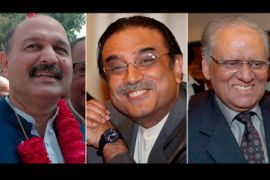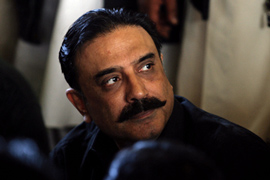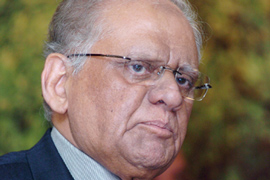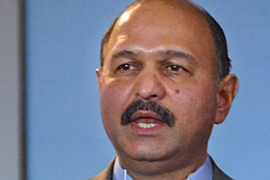Profiles: Presidential candidates
Facts about Pakistan’s three main presidential candidates.

| Asif Ali Zardari |
 |
|
Zardari is expected to win the vote [AFP]
|
Former prime minister Benazir Bhutto’s widower and political successor.
Thrust into the heart of Pakistani politics after his wife’s assassination on December 27 and following his Pakistan People’s Party (PPP) election victory on Februrary 18.
Born in the southern province of Sindh to a land-owning family, Zardari, 53, has long been a controversial figure.
He served as a minister in his wife’s second government in the 1990s, and was a senator until 1999, but was accused of taking kickbacks on government deals and earned the nickname “Mr 10 Per Cent”.
Zardari spent 11 years in prison on charges of corruption and murder, although he denied all accusations and was never convicted. He was released on bail in 2004.
Last year, Pervez Musharraf granted an amnesty to Bhutto, Zardari and other PPP leaders from corruption charges under a power-sharing deal with Bhutto.
The PPP has rejected doctors’ reports that say Zardari has been suffering from depression and post-traumatic stress disorder after being tortured in prison.
He married Bhutto in 1987 and they had three children – two girls and a boy.
Analysts say Zardari should have enough electoral college votes to win.
| Saeed Zaman Siddiqui |
 |
|
Siddiqui was nominated by Nawaz Sharif [EPA] |
Siddiqui is a former judge, nominated for the post of president by the Pakistan Muslim League (Nawaz) party (PML-N), lead by, Nawaz Sharif, a former prime minister. The party came second in February’s parliamentary poll.
Siddiqui was a supreme court judge when he ruled in favour of Sharif when he was prime minister in a confrontation with the judiciary in 1997.
Siddiqui lost his job as a supreme court judge after Musharraf, then head of the army, overthrew Sharif in a 1999 coup and demanded an oath of allegiance from members of the judiciary.
Born in 1937 in Kolkata, in then British-ruled India, Siddiqui moved to Pakistan with his family in 1956.
| Mushaid Hussain Sayed |
 |
|
Sayed was detained for more than a year after the 1999 coup [EPA] |
Sayed was nominated by the Pakistan Muslim League which backed Musharraf and ruled under him.
After the February elections it was the main opposition party in parliament until Sharif’s PML-N broke away from the ruling coalition last week.
Sayed, a former journalist, served as information minister in Sharif’s cabinet until the government was forced from power by Musharraf’s 1999 coup.
He was detained for more than a year after the coup, but upon his release joined the party Musharraf pieced together to provide him with a base of support, and was elected as a senator.
He later became secretary-general of the so-called King’s Party, a moderate face in a conservative party that was defeated in February’s general election.
The son of an army colonel, Sayed studied at Georgetown University in the US.